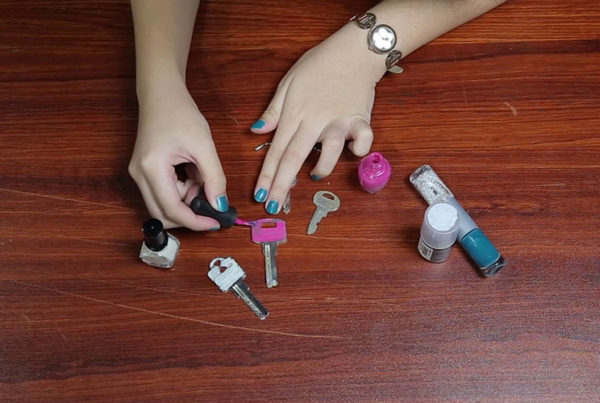Half the battle of studying is knowing how to study, and to help remember the information you need to suit the way in which your brain understands the material you have in front of you. The key is to study smarter, not harder, and to ensure that you learn effectively.
Studying using the rights tips can help you reduce stress and even retain more information, in the short and long term, so you can feel more confident when it comes time to sit down and complete difficult exams or tests.
Without further adieu, let’s improve your studying style by taking you through our step by step guide!
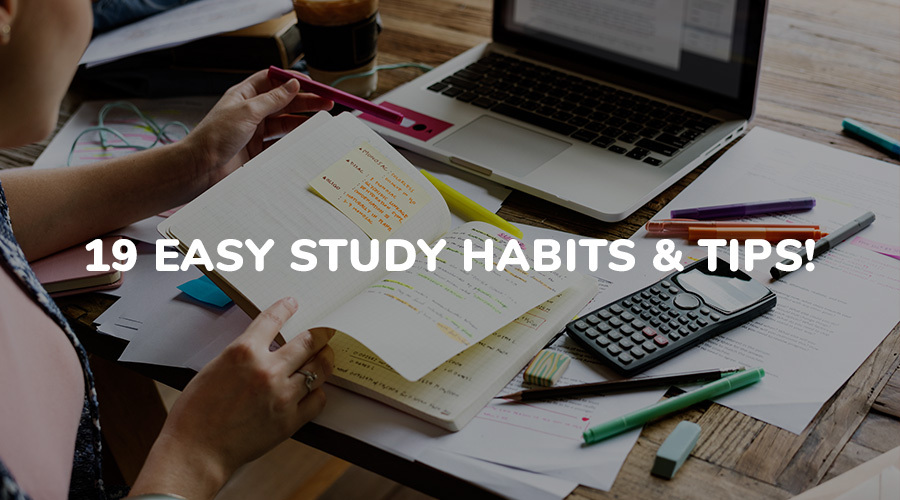
Study Habits & Study Tips
1. Stay hydrated to improve attention
The brain contains a significant amount of water and requires a constant flow of liquid in order to function properly and to be able to retain information in the short term and long term. Water helps the body regulate hormones which control stress, appetite, sleep, and the nervous system making signalling more efficient and improving concentration, attention span, and brain function.
Studies have indicated that drinking enough water improves attention span by up to 25%!
Water also helps you get rid of harmful toxins from different organs in the body, and allows the body to effectively deliver oxygen allow cells to function effectively within the body thanks to oxygen-rich blood.

2. Exercise to improve brain function
Regular exercise is vital to optimal learning abilities.
It will help you improve your alertness, reaction time, energy levels, alongside attention and motivation. Exercise is a renowned mood booster, which allows you to maintain the correct mindset when understanding and retaining information.
When you exercise, your brain produces proteins, FNDC5 (Irisin) and another protein known as BDNF (Brain-derived neurotrophic factor). BDNF stimulates your body to grow new nerves, protects existing brain cells and more. The hippocampus, the part of our brain that works on learning and retaining information, is incredibly receptive to the two aforementioned proteins.
Try to create an exercise regime that complements your regular routine. Combining exercise with a solid sleep cycle, a balanced diet and set study periods can help you to ensure that you are well prepared for upcoming assessments.

3. Maintain regular sleep cycles to improve memory
Studies have concluded that sticking to a regular sleep pattern, particularly right after an evening of studying, can help the brain retain information better. Even a nap after an afternoon study session can help you recall information easier than cramming without sleep right up and until your exam or assessment.
Depriving yourself of sleep is well known to impact cognitive functions that depend on the prefrontal cortex of the brain, which results in a negative influence on understanding and storing information. Sleep loss activates the sympathetic nervous system, leading to a rise in blood pressure and increased levels of cortisol in the body.
Increased levels of cortisol contribute to stress and toxicity in the body, reducing your ability to think clearly and affecting your cognitive ability, concentration and attention span.
Sleeping soundly may seem impossible during a stressful exam period, but it is well worth it to ensure you stay physically and mentally healthy!

4. Maintain a balanced diet, or improve your diet now!
A balanced diet is essential for studying as the body and brain need specific nutrients and vitamins in order to function properly. For example, a mineral such as iron can be responsible for directly decreasing dopamine levels, which can negatively impact cognition.
Other vitamins, like thiamine (vitamin B1), vitamin E, iodine, and zinc improve cognitive ability and concentration.
The good news is that improving your diet doesn’t have to be hard, and you can include the following fruits, vegetables and proteins into your daily diet during exam season to supplement your body with the right vitamins and nutrients.
- Protein: in the form of meta, oily fish, eggs, poultry, legumes, nuts, seeds, dried beans, lentils, dairy products and soy products.
- Monounsaturated fats: avocados, nuts, olive oil, canola oil, peanut oil.
- Tea and coffee (green tea specifically) but not too much and remember to keep up your water intake.
- Vegetables such as broccoli, kale, spinach, chard (packed with vitamin K)
- Fruits: Blueberries, strawberries, blackberries & oranges (antioxidants & vitamin C)
Greek yoghurt.

5. Create a clean, organised space to focus better
An untidy space can be linked to a decreased ability to concentrate on matters at hand.
Clutter is distracting, which is the last thing you need when trying to remain concentrated on the material you’re studying. In addition to a clean tidy space, your study space should ideally remain quiet so that you can focus on remembering the facts correctly.
This is one of the reasons why libraries are great places to study, but a small room in the corner of your house at home that’s away from distractions will also provide the perfect space for your study sessions.

6. Track your progress by setting goals & milestones
Setting daily goals for the work you’re studying is imperative to ensure you cover all that you need to know before your assessment.
Goals are not only useful for tracking your progress but they also provide a form of positive reinforcement. You’ll feel as if you’re being successful and making minor but significant achievements day-to-day as you work through your coursework.
To make things more interesting, you can also set yourself rewards for each milestone you reach, whether it’s a piece of chocolate, or 15 minutes on your phone for every hour or chapter you study.

7. Pace yourself by spacing out your work
In the days and weeks leading up to your test or exam, you should take the bulk of the material you need to study and break it up into smaller amounts.
For example, if you’re studying a large portion of a textbook, consider breaking up the content so you can cover a few chapters a day, rather than trying to cram and run through all of the content at once.
Breaking up segments of the material will help you remember key points more accurately, and allow you to focus on digesting important information more easily.
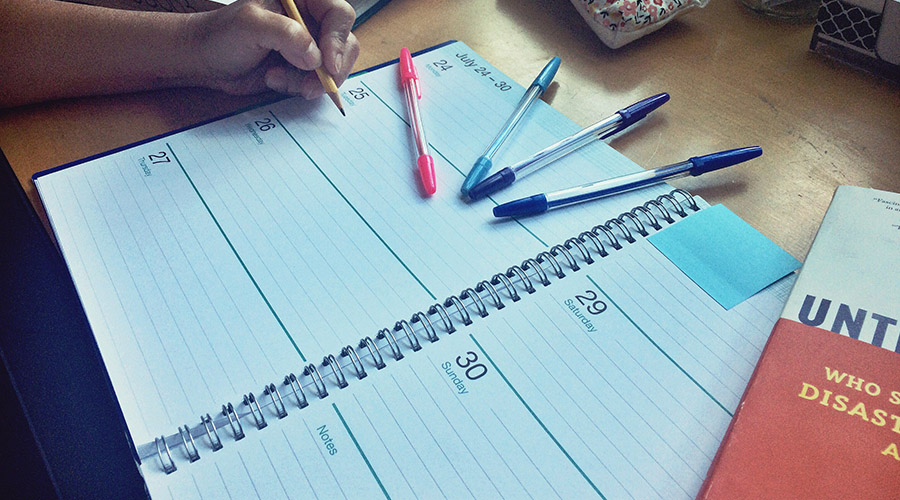
8. Use a Pomodoro to optimise your attention span
The Pomodoro method involves studying for at least 20-25 minutes, followed by a 5-minute break to allow you to gather your thoughts, while you take a walk, make a cup of coffee or get a snack. After four rounds of studying for 25 minutes and taking a 5-minute break in between, you should take a longer break of 15-20minutes.
The idea is to improve the quality of your work within this 20-25minute study period. The mind benefits from shorter periods of quality productivity that won’t overwhelm it. The brain also enjoys the incentives that come with these shorter, quality periods of productivity.
Give it a try and see what you think!
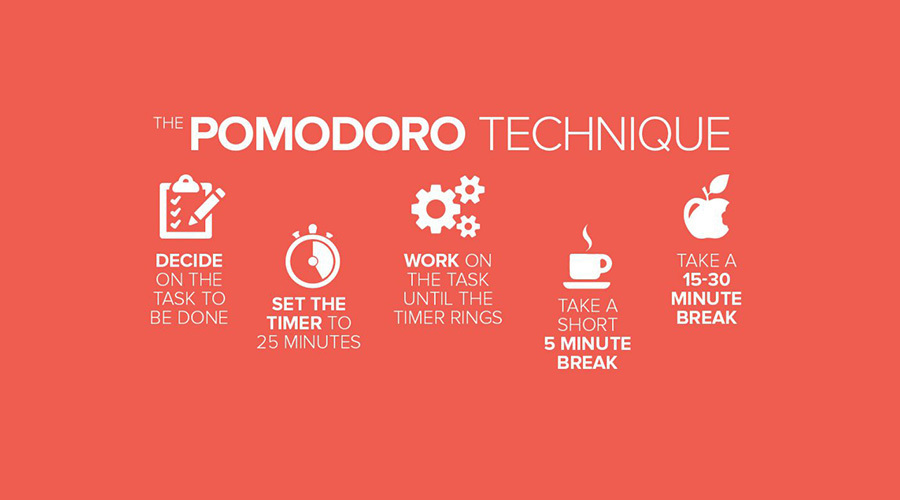
9. Create mind maps & concept maps to visually link concepts
Mind maps and concept maps are incredibly useful for linking key points about subjects into a visual format that is more digestible and easier to remember.
These maps are brilliant for those with a propensity to learn in a visual form especially with regard to complex problems that may be outlined in hundreds or even thousands of words.
Concept maps are similar but involve the intermingling of more components relating to a subject and how these components may contain more complex relationships that influence one another.
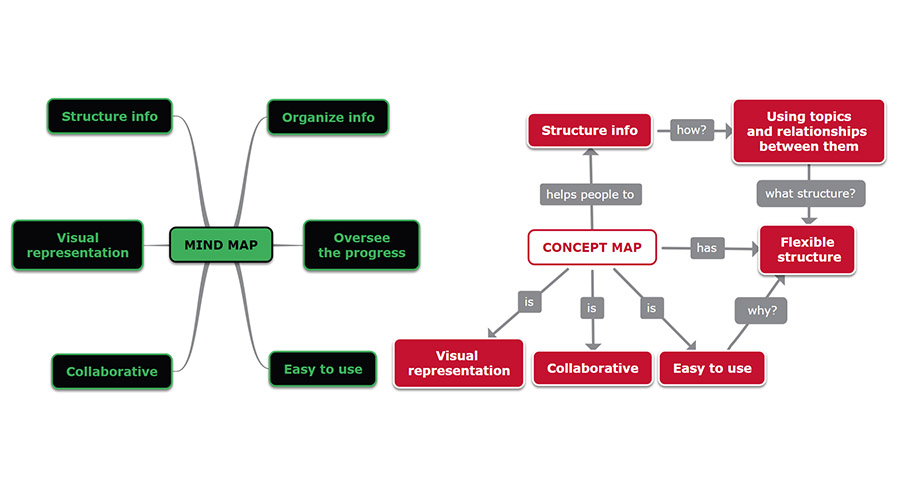
10. Use acronyms & mnemonic devices to remember lists
Easy-to-remember acronyms are mnemonic devices that provide a great way to distil the key facets of a subject and the order in which these points matter most.
Instead of remembering paragraphs of information relating to each keypoint inside a subject, you can derive a catchy acronym that will help you spark ideas relating to each key point you need to remember to complete parts of your assessment.
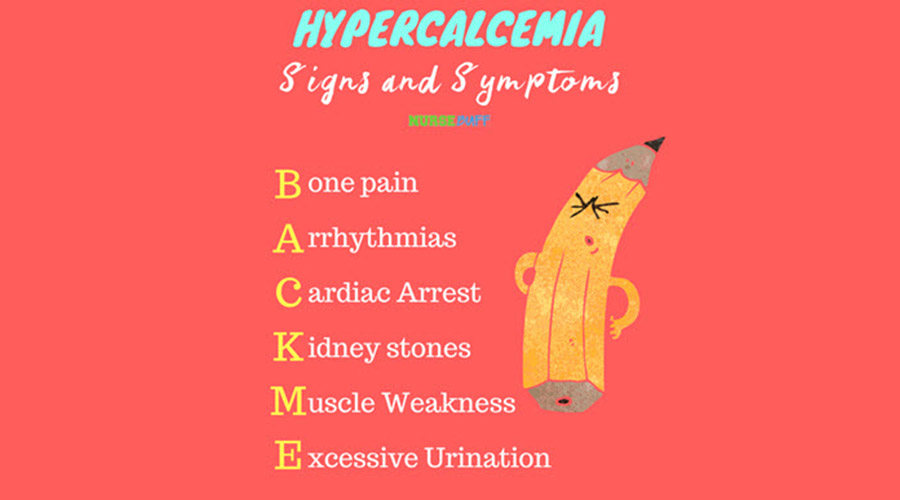
11. Use colours & assign them to specific points/subjects.
Colours are useful for a number of reasons.
Colours can help improve your attention span by acting as positive reinforcement, and they are also incredibly useful to separate and organise information in a user friendly manner.
Colours can be used to denote primary topics as well as subtopics by associating these elements with specific colours. Colours can indicate the significance of more important points and are great for those that benefit from visual learning techniques.
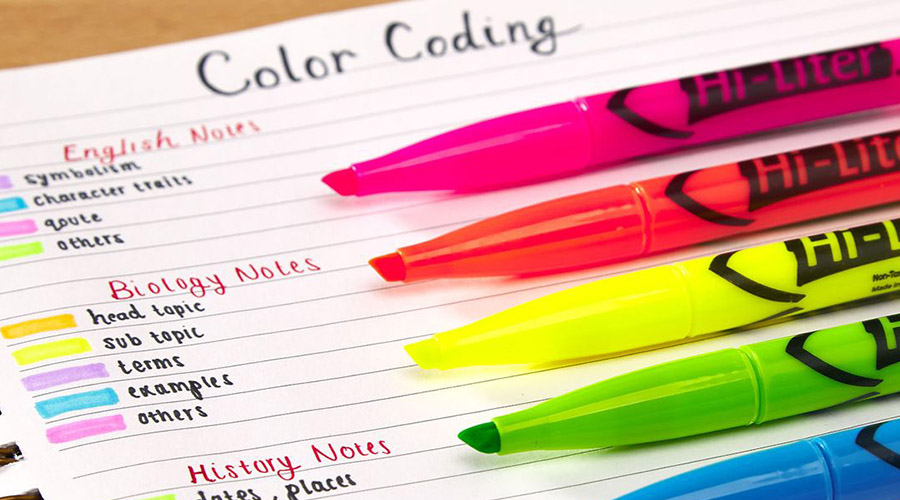
12. Use pictures & create diagrams
Diagrams help you understand information relating to processes and the relationships they may have with one another and how these elements may work together.
Like other visual learning techniques, the brain transfers visual information from the eyes to the thalamus which communicates with different parts of the cortex in the brain.
You could also colour code diagrams in order to assign specific significance to aspects of information which can add further value to your learning process.
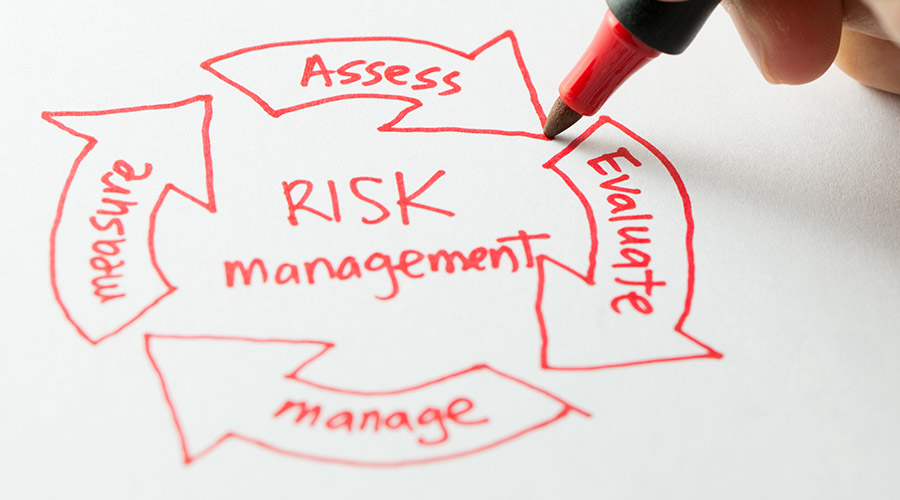
13. Make use of calming music without words – or study quietly
Using music as an aid while learning and retaining information can also help you study, provided that it is the right kind of music that isn’t too distracting (especially when you’re digesting complex information).
Studies have shown that listening to music can reduce cortisol levels in the body, which results in reduced stress and in turn improved concentration. Specific songs and genres can also improve mood and mindset which can help motivate you while studying.
Music targets the same reward centers in your brain that are also stimulated by other things you enjoy. Classic music has been shown to increase the brain’s ability to perform better when it comes to memory and processing tasks.
However, it is also true that music can also distract you sometimes and silence might be the answer to difficulties while studying.
Studies have indicated that the silence can assist the brain in analysing and interpreting complex information faster without ambient noise present. Listening to stimulating music may also distract you from the important tasks at hand.
Just something worth remembering the next time you’re listening to your favourite tunes while flipping through your textbooks.

14. Engage with material by discussing and debating it with friends
Having peers and friends to study alongside can help you learn new techniques and ways to process and understand information. Studying with others can also help you understand information and processes that you may be struggling to understand – as the saying goes, two heads are better than one!
Bouncing your thoughts about coursework off of your friends will also allow you to understand different perspectives relating to the topics at hand. You may also be able to share notes, and find key points you may have missed while you were taking your own notes.
Studying with a group may also help you to improve your listening skills and prepare you to work within a team in the future.

15. Create bullet-point lists to distill key information
Bullet point lists contain all of the distilled key points about information you’re studying, allowing you to keep track of the most important elements relating to the topics you’re studying.
Once you have your key points, you could convert them into a mindmap, for example, where you can flesh out these key points a little more in a visual format without having to remember paragraphs and paragraphs of information.
Remember to keep your bullet points limited, in order to only retain the key points necessary to help you understand the subject matter required for your assessments.

16. Create flashcards to test your learning
Flashcards are a versatile studying tool that allow you to summarise large amounts of information and can help you retain facts far easier.
Flashcards may contain key points, definitions, and unpack small portions of information relating to subtopics of subjects you’re studying. You can pair your flashcards with specific colour codes to organise information better too.
Furthermore, flashcards form part of the Leitner system, which can be used to retain and recall information better, which may lead to a better result when it comes time for tests and exams.
The Leitner system involves compiling flashcards into groups and testing yourself on the information pertaining to each flashcard and improving your ability to recall information.
The system works as such: a learner picks up a flash card from the first group, and if they recall the information written on the card, the learner can set the card aside within a second group, however, if the learner fails to remember the information on the flashcard, they would return the card to the first group in order to try again. This process is continued with increasing time intervals in order to practise the learner’s ability to recall information quicker and quicker until it is almost second nature.
This is a brilliant way to improve your short and long term memory about subjects and to make sure that you’re completely confident with the information you’re studying. Remember to craft your key cards legibly so you’re able to grasp information quickly during the process.
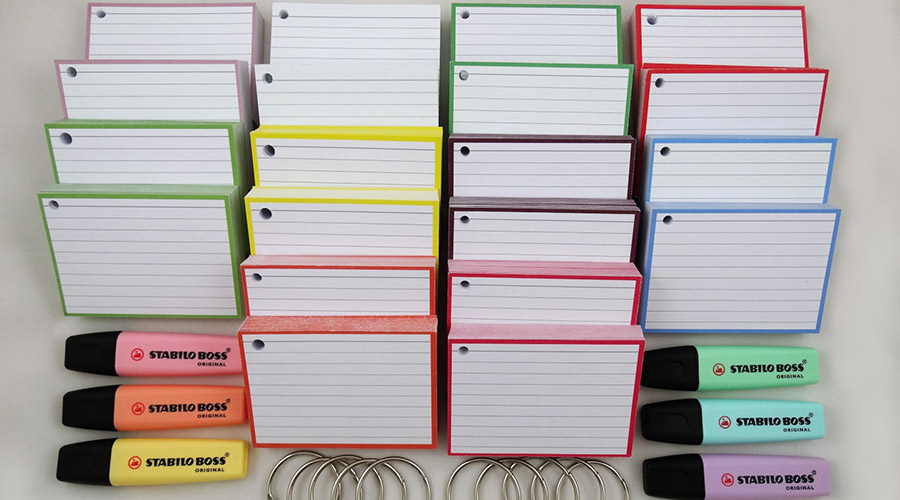
17. Use video resources for difficult topics
Videos can help you understand complex topics better and may be more engaging than reading information written on pages and pages inside mundane textbooks. Videos are digestible which can help you to avoid overloading your brain with too much information.
Videos are also replayable, making it easy for you to go back and revisit information about complex topics you may not have understood completely when you interpreted it for the first time.

18. Construct physical models
If you can purchase, or construct, physical models during the learning process it may help you to visualise information better, and allow you to examine more complex theories and information. Visual and tactile learning may help us retain information easier and develop a better understanding of high level thinking around a specific subject.
Physical models may also allow you to simulate specific scenarios, and how different aspects of a theory or problem interact with one another. This is particularly useful for those studying subjects such as science, biology and engineering for example.

19. Do practice tests
Once you have a grasp on the information required for your assessment, the best thing you can do to improve the retention of information is to practise, practise and practise.
Completing tests and mock exams set in previous years will prepare you for the real thing – allowing you to get a head start on what to expect, and how assessors may pose short and long-form questions throughout your test or exam.
It’s likely that your university will provide you access to papers and memorandums set by assessors in the last few years, which you can use to determine the way in which you’ll need to answer questions and any information you might be missing.
Of course, previous years’ papers may not assess all of the information you need to know, but they will probably cover most of the information required for your upcoming exam or test. Doing practice tests can help you increase your marks significantly when it comes time to take your final tests and exams.

If you’re looking for other students tips, such as student accommodation life hacks, you might like to know 17 things that are essential when signing your first lease or finding the best banks for students, or information concerning NSFAS student loans.
Preparing for tricky tests and exams is made all the more difficult without the right living space. At NEST, we provide our students with modern rooms completed with all of the trimmings, including access to high speed WiFi, sleek furnishings, spacious living environments, 24/7 security, a rooftop gym and stunning views of the Mother City’s Table Mountain!
We’re just a stone’s throw away from the Jammie Shuttle stop – ideal for UCT students – plus Damelin is across the road, with other universities like Varsity College and AFDA nearby.
Find out about our student accommodation and contact us to set up an in-person visit.




